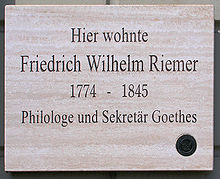Friedrich Wilhelm Riemer
Friedrich Wilhelm Riemer (born April 19, 1774 in Glatz ; † December 19, 1845 in Weimar ), pseudonym Silvio Romano, was a German teacher, writer, librarian in Weimar, who became known as Goethe's secretary (from 1814) .
Life
Friedrich Wilhelm Riemer, son of a civil servant, came to the Maria-Magdalenen-Gymnasium in Breslau in 1787 (at the age of 13) . Because of his clear and orthographic handwriting, the Rector Johann Kaspar Friedrich Manso often asked him to produce fair copies of his own essays, reviews and poems, which he himself often found illegible. The rewards for such service were not just money and textbooks. The principal also invited the pupil to dinner and took him as a companion on his walks. Since 1794 Riemer studied philology and theology in Halle (Saale) . Then he was tutor for the children of Wilhelm von Humboldt and accompanied the scholar to Italy. From September 4, 1803, on Humboldt's recommendation, he stayed at Goethe's Weimar house. From 1803 to 1808 he taught his son . From 1806 he accompanied Goethe several times on trips to Karlsbad . With great diligence and a considerable willingness to give up, Riemer edited Goethe's works for the purpose of creating a final edition and other editions for many years .
From 1812 to 1821 Riemer was a teacher at the Wilhelm-Ernst-Gymnasium in Weimar . From 1814 he was a librarian. In 1827 he succeeded Christian August Vulpius as senior librarian of the Weimar library . On January 22, 1831, Goethe last willingly installed Riemer alongside Eckermann as editor of his works that had not yet been published in the complete edition. The project was completed by 1842. In 1841 Riemer had his communications about Goethe appear in print. He also published the correspondence between Goethe and Carl Friedrich Zelter .
Under the pseudonym Silvio Romano he published two volumes of poetry with the title Flowers and Leaves from 1816 to 1819 . The person of Riemer is known not least from the description in Thomas Mann's novel " Lotte in Weimar " (1939).
Goethe on Riemer

"Mr. Riemer, who came from Rome with Prof. Fernow , has decided to stay with us this winter and especially to take on my boy's lessons in Greek and Latin."
“Riemer is very good. We are now reading Wilhelm Meister together, preparing a new edition . Since I wrote this little work, like my other things, as a nightwalker, his remarks about my style are most instructive and graceful "
“At 6 o'clock Hofrath Riemer. Mancherley Concepte ran away with him. "
Student song
No student song comes directly from his pen, but he created verses that Goethe may have used as a model for his text of the student song "Ergo Bibamus":
Listen friends, I tell you an excellent word that
is: "Ergo bibamus!"
nothing helps you anywhere
like: "Ergo bibamus!"
For whatever pleases you and whatever troubles you, just
consider the word and do what it says,
the "Ergo bibamus!"
Publications
- Small Greek-German hand dictionary. Elaborated for the best of beginners. Second revised and much increased edition, Jena: Frommann, 1815–1816.
- Flowers and leaves , Leipzig: Cnobloch, 1816/1819.
- Communications about Goethe. From oral and written, printed and unprinted sources. Two volumes, Berlin: Duncker and Humblot, 1841.
literature
- Julius Wahle : Riemer, Friedrich Wilhelm . In: Allgemeine Deutsche Biographie (ADB). Volume 28, Duncker & Humblot, Leipzig 1889, pp. 559-564.
- Klaus Manger: Riemer, Friedrich Wilhelm. In: New German Biography (NDB). Volume 21, Duncker & Humblot, Berlin 2003, ISBN 3-428-11202-4 , p. 596 f. ( Digitized version ).
- Arthur Pollmer : Fr. W. Riemer and his communications about Goethe. Leipzig 1922 [fundamental]
- Gero von Wilpert : Goethe-Lexikon (= Kröner's pocket edition . Volume 407). Kröner, Stuttgart 1998, ISBN 3-520-40701-9 .
- Karl Otto Conrady : Goethe - life and work . Düsseldorf and Zurich 1999, ISBN 3-538-06638-8
- Werner Liersch : Goethe's doppelganger. The secret story of Doctor Riemer. Berlin 2001, ISBN 3-7466-1748-0
Web links
- Literature by and about Friedrich Wilhelm Riemer in the catalog of the German National Library
Individual evidence
- ^ Raimund Lang, "Intonas", "Acta Studentica", No. 93a, ed. "Österr. Association for Student History", Vienna, 1992
- ↑ Ergo bibamus! , P. 307 in Poems by Friedrich Wilhelm Riemer. First ribbon. Jena, by Friedrich Frommann 1826
| personal data | |
|---|---|
| SURNAME | Riemer, Friedrich Wilhelm |
| ALTERNATIVE NAMES | Romano, Silvio (pseudonym) |
| BRIEF DESCRIPTION | German philologist, writer, librarian and Goethe's secretary |
| DATE OF BIRTH | April 19, 1774 |
| PLACE OF BIRTH | Bald |
| DATE OF DEATH | December 19, 1845 |
| Place of death | Weimar |
